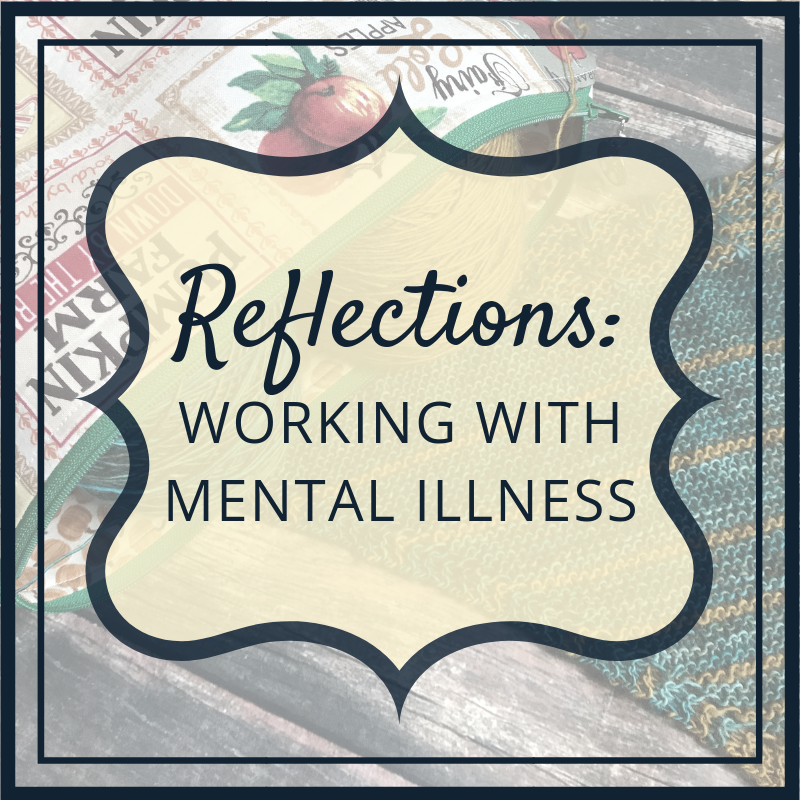Working with Mental Illness
Since Mental Health Awareness Week was earlier this month (I’m behind as always!), I thought I’d take a little time to open up about what I’ve been battling for the last year. I had originally titled this post "Working through Mental Illness," but quickly decided it was misleading. It implied that at some point, mental illness will be gone. The reality for many people is that mental illnesses are a lifelong battle, and I can't predict the future.
What I am doing, though, is working with mental illness, specifically generalized anxiety disorder and (to a lesser extent) depression. These things impact different sufferers in different ways--or even the same sufferer in different ways at different times. For me, they have physical symptoms as well as mental ones. Prior to and shortly after being diagnosed, I lost 12 pounds because I simply couldn't eat--I would take a few bites and feel sick. Physically I felt shaky and on edge, like I was always ready to run (ie, fight or flight). Mentally, my brain was too full of repetitive, irrational worries to focus on anything. I felt disconnected and often like I was stuck in a dream—or worse, a nightmare, with a pervasive but unnamed fear that just wouldn’t go away. I was struggling just to do the basics: get up, get dressed, get my kids to and from school, and take care of them when they weren't in school. And between not eating, not sleeping, and spending the day battling with my own brain, I was exhausted (plus, I had stopped drinking caffeine because it added to jitteriness!)—work was out of the question.
Now, I am thankful to say that I'm in a better place--I am balancing work life, mom/wife life and self-care, and most days I feel almost 100% back to normal. Over the last year, I have tried numerous treatments and coping mechanisms and have found things that help: less caffeine, (almost) daily yoga, breathing exercises, sleep stories, sun exposure (or a light box when days are gray), and yes, meds. I currently take 15omg of Effexor daily, as well as a low-dose anti-depressant, Trazodone, as a sleep aid. (Ironically, while knitting has been shown to help many people cope with anxiety, I’ve found that the mindlessness of it sometimes actually frees my brain up to focus on irrational thoughts and fears!)
But there are still bad days, sometimes bad weeks. Where I just can't focus, where my brain is cluttered with irrational thoughts and fears, where I can't escape the feeling that something terrible is going to happen, and where everything seems pointless and doomed. "Ugh. Post to Instagram again? Why bother?" The coping mechanisms I’ve established over the last year make those days and weeks easier to handle, but they don’t eliminate them.
Often I ask myself why this has happened. I have two beautiful children, a caring husband, a safe and secure home, and food on the table—objectively there seems to be little in my life to be depressed or anxious about. But mental illness doesn’t always work that way. Some people can point to a specific incident that caused their mental illness (PTSD, for example), but for others, there may be a combination of factors, or no identifiable cause at all. And while identifying a cause might help some people cope better, constantly reviewing my life looking for a cause—Did I not properly grieve after my mom died? Is the pressure of caring for 2 special needs children too much for me? Did quitting my job to care for the kids leave me with no purpose in life? Have I mentally blocked out a traumatizing event from my past?—just made things worse for me.
So I continue to work with and cope with mental illness. I understand that I may never again feel 100% me all the time, and I work to accept it. And I try to make the most of my good days, and not let the bad days drag me down.

